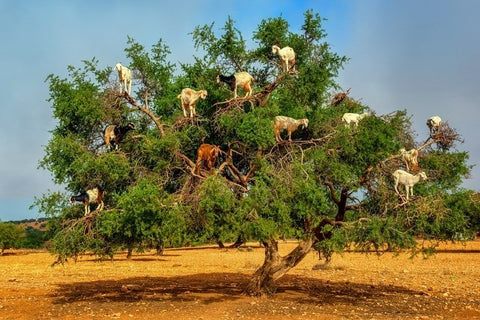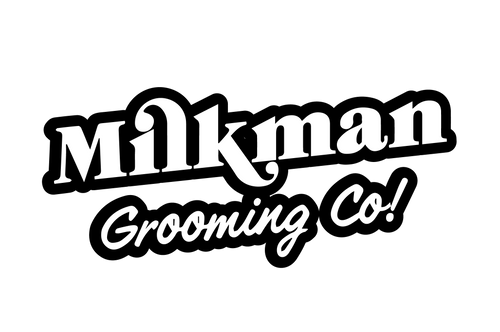The Truth About Argan Oil


In 2007, “the most expensive oil in the world” was Argan oil, A.K.A, Moroccon oil, fetching $40 per 100mL in some cases, and there are good reasons why.
Argan oil dates back centuries, with the Indigenous communities in Morocco, namely Imazighen, using it for traditional medicine. The oil is produced from the kernels of the Argan tree that have been growing along the coast of Morocco for 80 million years. The tree is precious in Morocco, and many communities heavily rely on it to this day. The canopy of Argan tree forests provides valuable shade in a hot climate, keeping the soil fertile and protecting many land animals. Its deep root system also allows it to survive dry and arid environments for a life spanning over 150 years, while also resisting fungi and parasites. Imazighen use Argan wood for heating, construction and tools. Its leaves feed livestock and the oil extracted is used for cooking and disease treatment. Evidently the Argan tree is extremely valuable.
Properties of Argan oil include anti-inflammatory, anti-oxidant and scar healing. It is also excellent in protecting and moisturising skin and hair - which makes it a perfect ingredient in a quality beard oil. This is due to the unsaturated fatty acids, polyphenols and anti-oxidants that the oil possesses. These properties also make it protective of the cardiovascular system. This is because unsaturated fatty acids, or “good cholesterol” counter acts saturated fatty acids (low density lipoprotein), or “bad cholesterol,” which contribute to the thickening and obstruction of blood arteries. Good cholesterol also forms the building blocks of our cells and their membranes. Therefore, applying Argan oil on our skin and hair cells strengthens and repairs the composition of them, keeping them healthy and strong. Finally, the antioxidants present in Argan oil such as tyrosol and vitamin E help prevent cell damage and cell death by preventing harmful free radicals from reacting with our cells which can destroy them. A review study by El Abbassi et al (2013) also notes that constituents of Argan oil can help prevent cardiovascular diseases, diabetes, enhances our immune system, and may even be anticarcinogenic.
Traditionally, only Imazighen women are exclusively allowed to cultivate the use of the Argan tree. For example, the extraction of oil from the kernels begins with the collection of the nuts. Nuts are collected either from the ground which have fallen from the tree, or from the spit of the infamous Argan tree goat, which eat the fleshy part of the nut and then spit it back out. These are then cleaned, processed, and cracked all by hand. The extracted kernels are then roasted, crushed and hand-pressed by Imazighen women, with the oil eventually leaching out.
20 years ago saw a rapid decline in Argan tree numbers, with climate change and deforestation the main culprits. The Moroccan government, with the help of the UK, Japan and Monaco, all contributed to the implementation of a sustainable development program of Argan forests. This program is aimed at increasing and preserving the Argan species, consequently preserving traditional rural communities who depend on it significantly.
Soon, the remarkable and secret benefits of Argan oil was out and the world wanted its share. The remedial properties of the oil became well known and is now a desirable product in mainstream society. With the sudden increase in demand for the product, production needed to be increased to an industrial scale. As Imazighen women were the outright experts of Argan oil production, the idea was born to employ local women co-operatives to produce it. Traditional ways of production were replaced with industrial processes and the women were taught how to operate the new machinery. Eventually a small economy was built in rural Morocco and many local communities are now benefiting. The co-operative programs, which is now supported by the European Union, have also been developed to educate women in these areas, helping to increase to quality of life for many families.
Buying products with Argan oil, such as Milkman Grooming Co beard oil, helps support these communities in North Africa and help women become important in these regions. It has helped form the sustainable development of these communities which has facilitated them to become self-sufficient and indispensable.
References:
Charrouf Z, Guillaume D. 2008. Argan Oil: Occurrence, composition, and impact on human health. European Journal of Lipid Science and Technology 110: 632-638
Charrouf Z, Guillaume D. 2009. Sustainable Development in Northern Africa: The Argan Forest Case. Sustainability 1: 1012-1022
El Abbassi, A. Khalid N, Zbkakh H, Ahmad A. Physicochemical Characteristics, Nutritional Properties, and Health Benefits of Argan Oil: A Review. Cricitical Reviews in Food Science and Nutrition 54(11): 1401-1414
Photo credit:
Francis Naef. Available at: https://500px.com/photo/63872529/morocco-goats-on-argan-tree-by-francis-naef
- Tags: science
0 comments


